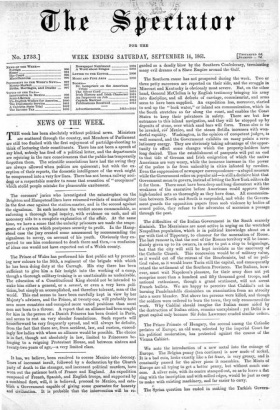The Southern cause has not prospered during the week. Two
or three petty successes are reported on their side, and the struggle in Missouri and Kentucky is obviously most severe. But, on the other hand, General McClellan is by English testimony bringing his army into discipline, and all defects of carriage, commissariat, and arms seem to have been supplied. An expedition has, moreover, started to seal up the "back water," or inland sea communication, which in the South stretches so far along the coast, and enables the Coast States to keep their privateers in safety. There are but few entrances to this inland navigation, and they will be stopped up by deposits of stone, over which sand bars will form. Texas also is to be invaded, el/ Mexico, and the steam flotilla increases with won- derful rapidity. Washington, in the opinion of competent judges, is well secured, and the Government exhibits on many points a revo- lutionary energy. They are obviously taking advantage of the oppor- tunity to effect some changes which the property-holders have long desired. Thus the establishment of passports will put an end to that tide of German and Irish emigration of which the native Americans are very weary, while the immense increase in the power of the police is far from unhealthy in cities infested by rowdies. Even the suppression of newspaper correspondence—a stupid measure while the Government relies on popular aid—is still a decisive hint that Government mean to govern, instead of letting the New York editors do it for them. There must have been deep and long discontent with the weakness of the executive before Americans could approve these high-handed acts so thoroughly as they have done. All communica- tion between North and South is suspended, and while the Govern- ment guards the opposition papers from mob violence by bodies of armed police, they refuse to the advocates of secession a passage through the post.






























